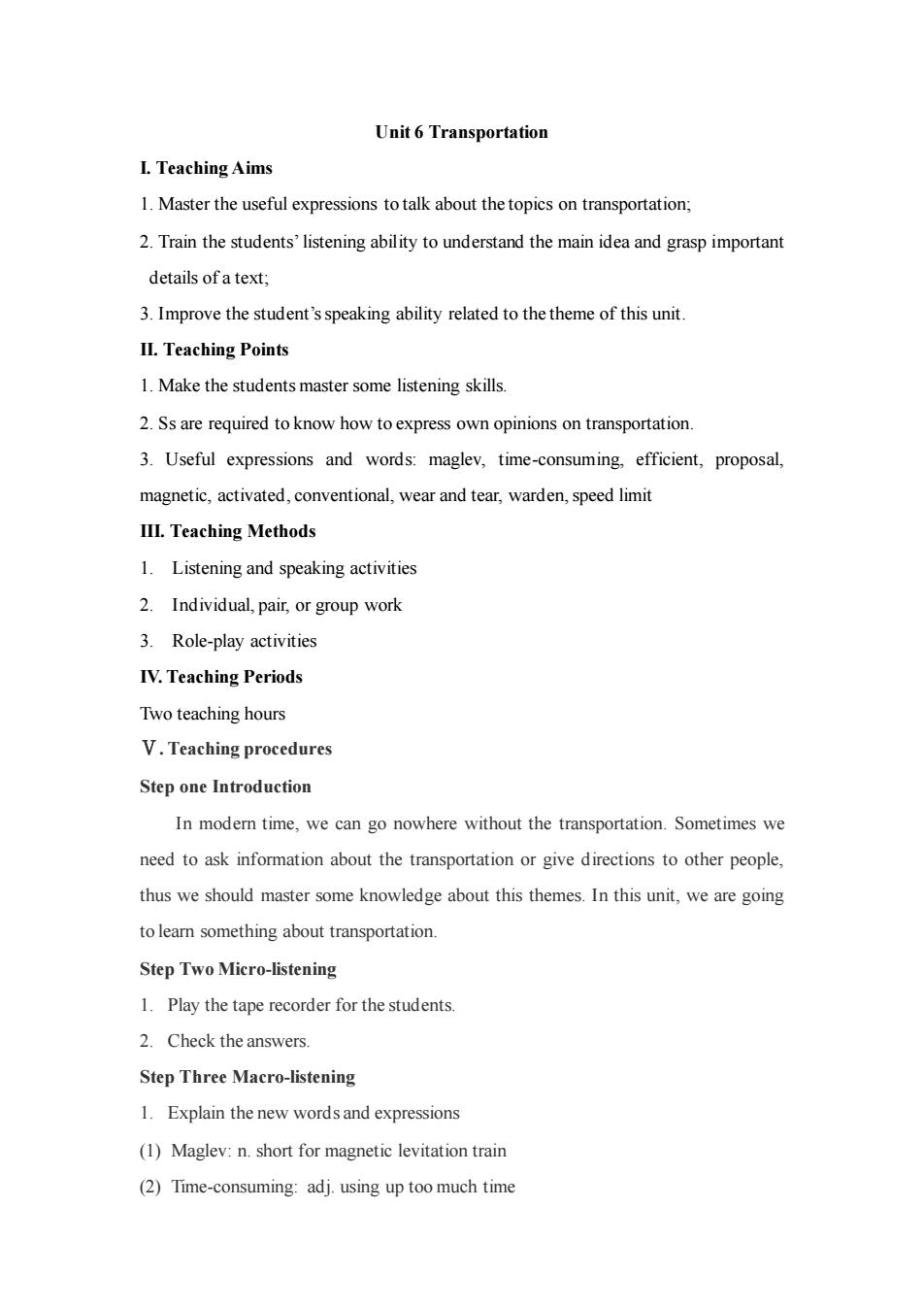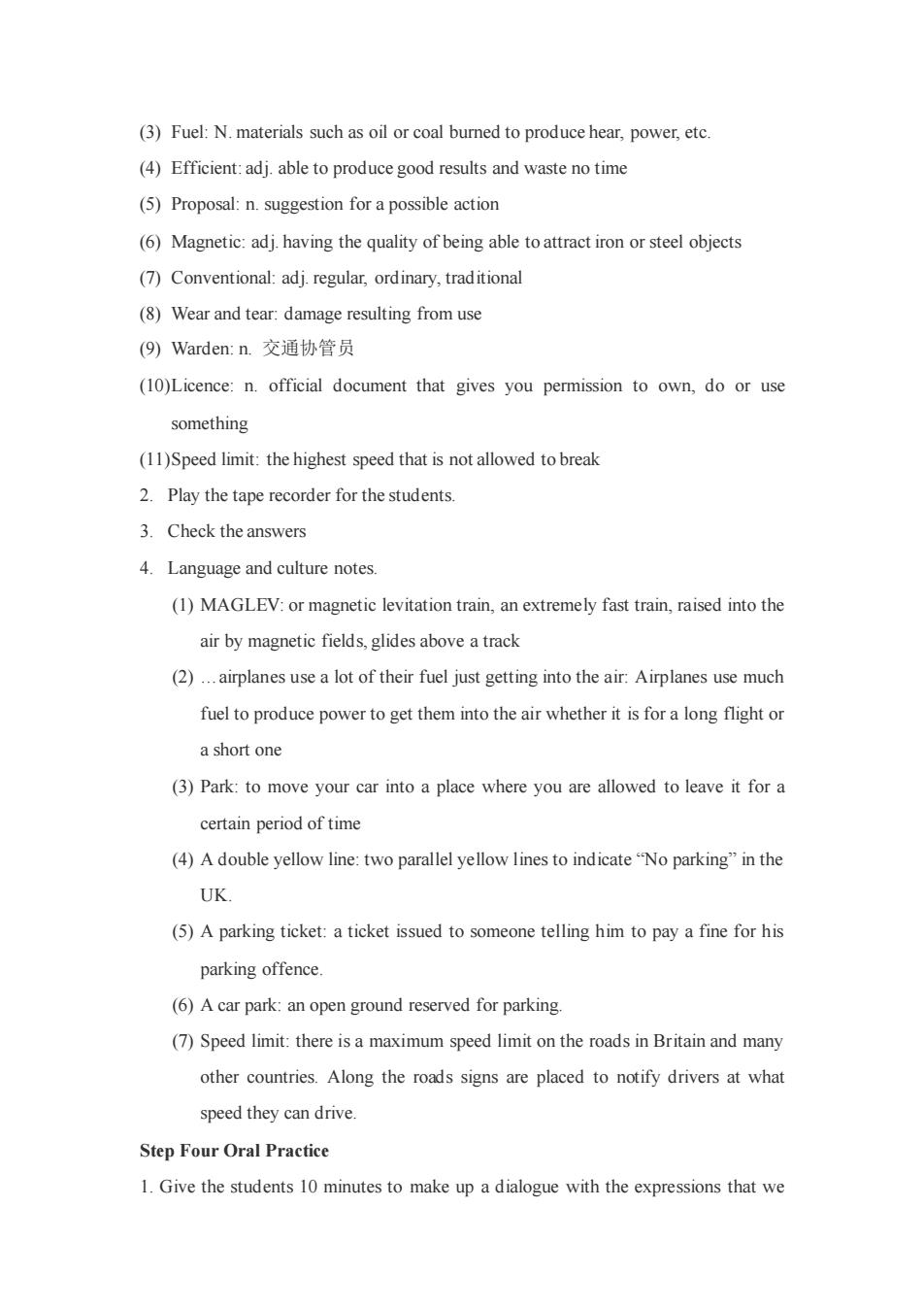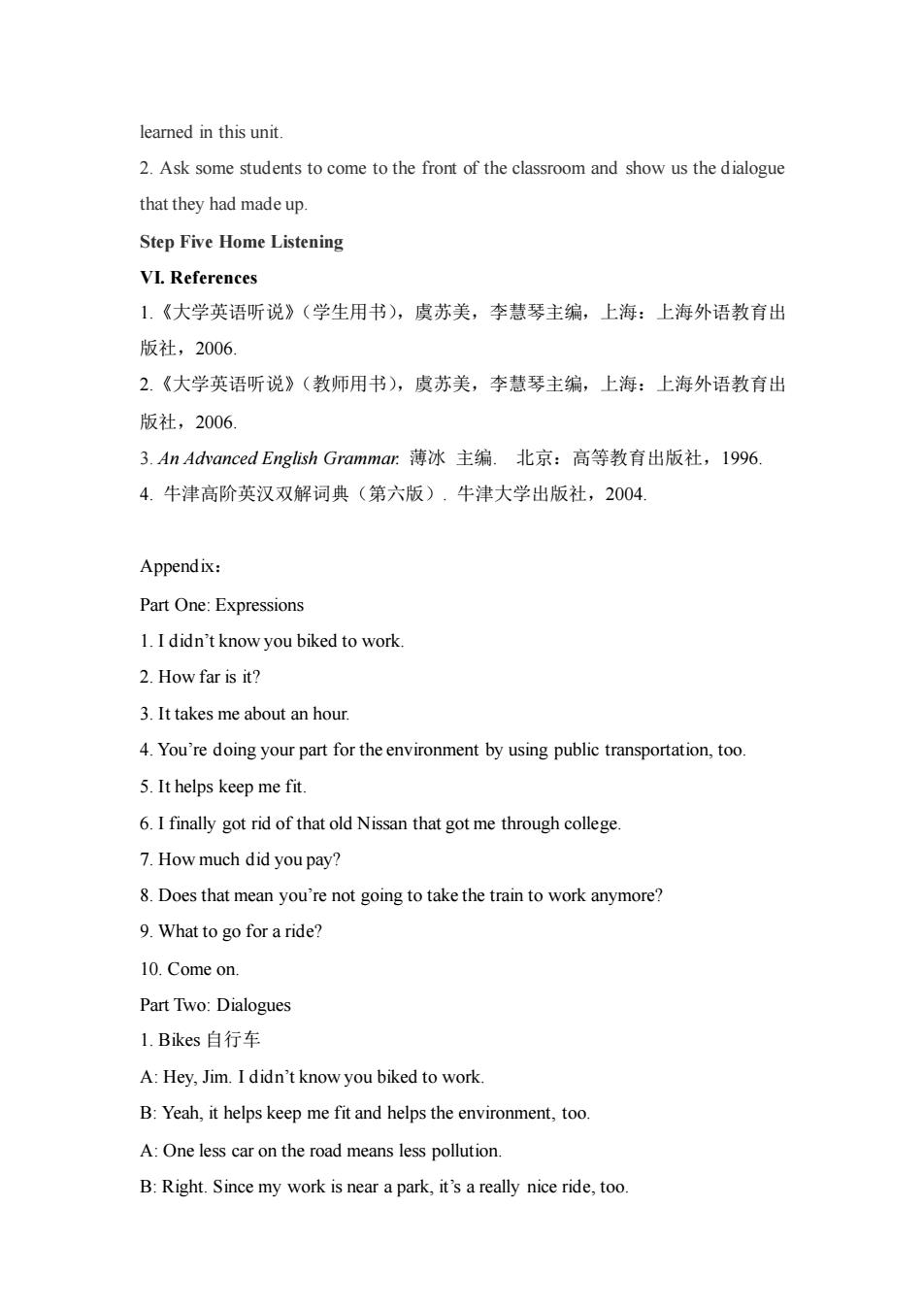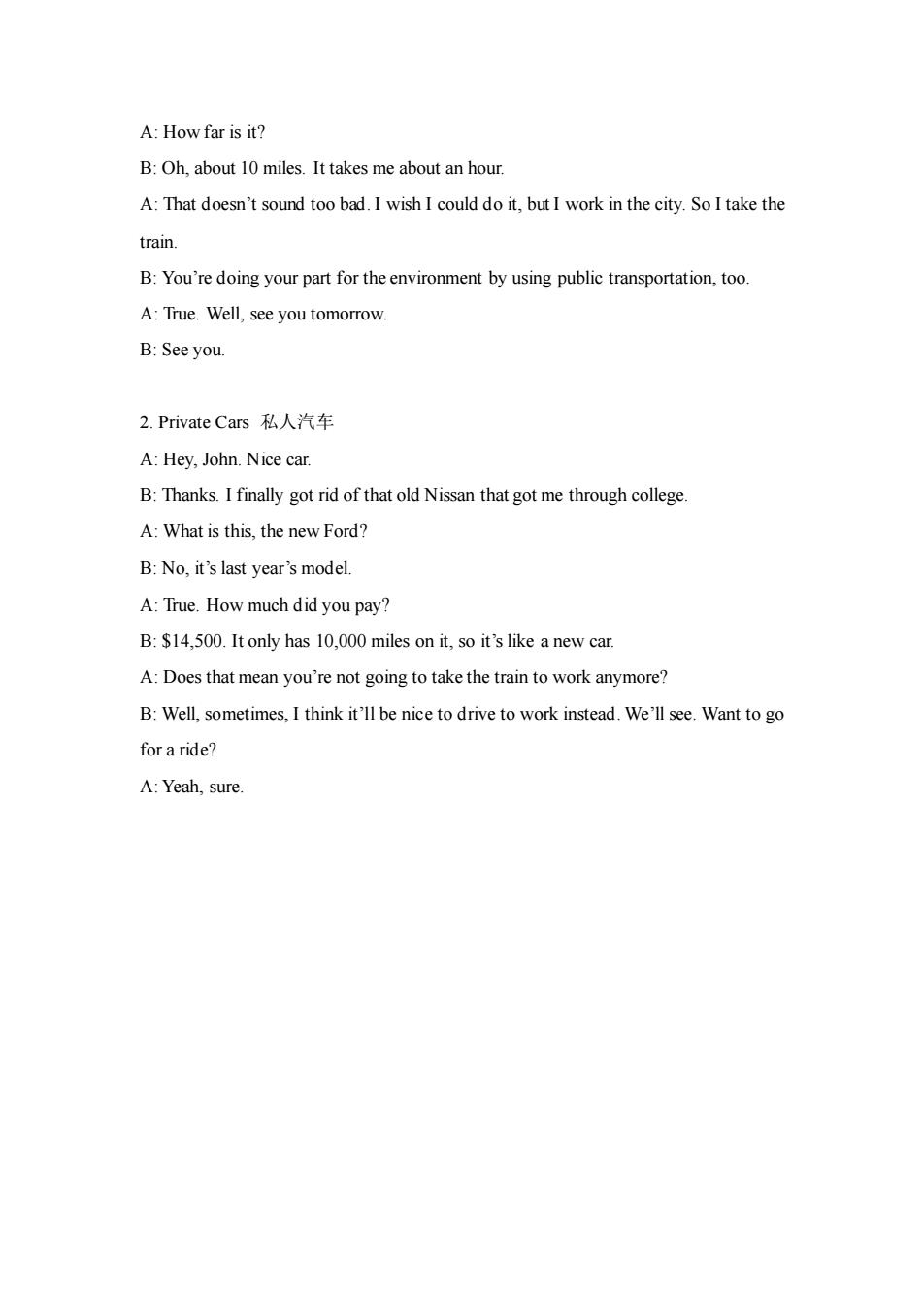
Unit 6 Transportation LTeaching Aims 1.Master the useful expressions totalk about the topics on transportation 2.Train the students'listening ability to understand the main idea and grasp important details ofa text. 3.Improve the student's speaking ability related to the theme of this unit. II.Teaching Points 1.Make the students master some listening skills 2.Ss are required to know how to express own opinions on transportation. 3.Useful expressions and words:maglev,time-consuming.efficient,proposal, magnetic,activated,conventional,wear and tear,warden,speed limit III.Teaching Methods 1.Listening and speaking activities 2.Individual,pair,or group work 3.Role-play activities IV.Teaching Periods Two teaching hours V.Teaching procedures Step one Introduction In modem time,we can go nowhere without the transportation.Sometimes we need to ask information about the transportation or give directions to other people thus we should master some knowledge about this themes.In this unit,we are going to leam something about transportation. Step Two Micro-listening 1.Play the tape recorder for the students 2.Check the answers. Step Three Macro-listening 1.Explain the new wordsand expressions (1)Maglev:n.short for magnetic levitation train (2)Time-consuming:adj.using up too much time
Unit 6 Transportation I. Teaching Aims 1. Master the useful expressions to talk about the topics on transportation; 2. Train the students’ listening ability to understand the main idea and grasp important details of a text; 3. Improve the student’s speaking ability related to the theme of this unit. II. Teaching Points 1. Make the students master some listening skills. 2. Ss are required to know how to express own opinions on transportation. 3. Useful expressions and words: maglev, time-consuming, efficient, proposal, magnetic, activated, conventional, wear and tear, warden, speed limit III. Teaching Methods 1. Listening and speaking activities 2. Individual, pair, or group work 3. Role-play activities IV. Teaching Periods Two teaching hours Ⅴ. Teaching procedures Step one Introduction In modern time, we can go nowhere without the transportation. Sometimes we need to ask information about the transportation or give directions to other people, thus we should master some knowledge about this themes. In this unit, we are going to learn something about transportation. Step Two Micro-listening 1. Play the tape recorder for the students. 2. Check the answers. Step Three Macro-listening 1. Explain the new words and expressions (1) Maglev: n. short for magnetic levitation train (2) Time-consuming: adj. using up too much time

(3)Fuel:N.materials such as oil or coal bumed to produce hear,power,ete. (4)Efficient:adj.able to produce good results and waste no time (5)Proposal:n.suggestion for a possible action (6)Magnetic:adj.having the quality of being able to attract iron or steel objects (7)Conventional:adj.regular,ordinary,traditional (8)Wear and tear:damage resulting from use (9)Warden:n.交通协管员 (10)Licence:n.official document that gives you permission to own,do or use something (11)Speed limit:the highest speed that is not allowed to break 2.Play the tape recorder for the students. 3.Check the answers 4.Language and culture notes. (1)MAGLEV:or magnetic levitation train,an extremely fast train,raised into the air by magnetic fields,glides above a track (2)...airplanes use a lot of their fuel just getting into the air:Airplanes use much fuel to produce power to get them into the air whether it is for a long flight or a short one (3)Park:to move your car into a place where you are allowed to leave it for a certain period of time (4)A double yellow line:two parallel yellow lines to indicate"No parking"in the UK (5)A parking ticket:a ticket issued to someone telling him to pay a fine for his parking offence (6)A car park:an open ground reserved for parking. (7)Speed limit:there isa maximum speed limit on the roads in Britain and many other countries.Along the roads signs are placed to notify drivers at what speed they can drive Step Four Oral Practice 1.Give the students 10 minutes to make up a dialogue with the expressions that we
(3) Fuel: N. materials such as oil or coal burned to produce hear, power, etc. (4) Efficient: adj. able to produce good results and waste no time (5) Proposal: n. suggestion for a possible action (6) Magnetic: adj. having the quality of being able to attract iron or steel objects (7) Conventional: adj. regular, ordinary, traditional (8) Wear and tear: damage resulting from use (9) Warden: n. 交通协管员 (10)Licence: n. official document that gives you permission to own, do or use something (11)Speed limit: the highest speed that is not allowed to break 2. Play the tape recorder for the students. 3. Check the answers 4. Language and culture notes. (1) MAGLEV: or magnetic levitation train, an extremely fast train, raised into the air by magnetic fields, glides above a track (2) …airplanes use a lot of their fuel just getting into the air: Airplanes use much fuel to produce power to get them into the air whether it is for a long flight or a short one (3) Park: to move your car into a place where you are allowed to leave it for a certain period of time (4) A double yellow line: two parallel yellow lines to indicate “No parking” in the UK. (5) A parking ticket: a ticket issued to someone telling him to pay a fine for his parking offence. (6) A car park: an open ground reserved for parking. (7) Speed limit: there is a maximum speed limit on the roads in Britain and many other countries. Along the roads signs are placed to notify drivers at what speed they can drive. Step Four Oral Practice 1. Give the students 10 minutes to make up a dialogue with the expressions that we

learned in this unit. 2.Ask some students to come to the front of the classroom and show us the dialogue that they had made up Step Five Home Listening VI.References 1.《大学英语听说》(学生用书),虞苏美,李慧琴主编,上海:上海外语教育出 版社,2006. 2.《大学英语听说》(教师用书),虞苏美,李慧琴主编,上海:上海外语教育出 版社,2006. 3.An Advanced English Grammar:薄冰主编.北京:高等教育出版社,1996. 4.牛津高阶英汉双解词典(第六版),牛津大学出版社,2004. Appendix: Part One:Expressions 1.I didn't know you biked to work 2.How far is it? 3.It takes me about an hour. 4.You're doing your part for the environment by using public transportation,too 5.It helps keep me fit. 6.I finally got rid of that old Nissan that got me through college 7.How much did you pay? 8.Does that mean you're not going to take the train to work anymore? 9.What to go for a ride? 10.Come on. Part Two:Dialogues 1.Bikes自行车 A:Hey,Jim.I didn't know you biked to work. B:Yeah,it helps keep me fit and helps the environment,too. A:One less car on the road means less pollution B:Right.Since my work is near a park,it's a really nice ride,too
learned in this unit. 2. Ask some students to come to the front of the classroom and show us the dialogue that they had made up. Step Five Home Listening VI. References 1.《大学英语听说》(学生用书),虞苏美,李慧琴主编,上海:上海外语教育出 版社,2006. 2.《大学英语听说》(教师用书),虞苏美,李慧琴主编,上海:上海外语教育出 版社,2006. 3. An Advanced English Grammar. 薄冰 主编. 北京:高等教育出版社,1996. 4. 牛津高阶英汉双解词典(第六版). 牛津大学出版社,2004. Appendix: Part One: Expressions 1. I didn’t know you biked to work. 2. How far is it? 3. It takes me about an hour. 4. You’re doing your part for the environment by using public transportation, too. 5. It helps keep me fit. 6. I finally got rid of that old Nissan that got me through college. 7. How much did you pay? 8. Does that mean you’re not going to take the train to work anymore? 9. What to go for a ride? 10. Come on. Part Two: Dialogues 1. Bikes 自行车 A: Hey, Jim. I didn’t know you biked to work. B: Yeah, it helps keep me fit and helps the environment, too. A: One less car on the road means less pollution. B: Right. Since my work is near a park, it’s a really nice ride, too

A:How far is it? B:Oh,about 10 miles.It takes me about an hour. A:That doesn't sound too bad.I wish I could do it,but I work in the city.So I take the train. B:You're doing your part for the environment by using public transportation,too. A:True.Well,see you tomorrow. B:See you. 2.Private Cars私人汽车 A:Hey,John.Nice car B:Thanks.I finally got rid of that old Nissan that got me through college. A:What is this,the new Ford? B:No,it's last year's model. A:True.How much did you pay? B:$14,500.It only has 10,000 miles on it,so it's like a new car. A:Does that mean you're not going to take the train to work anymore? B:Well,sometimes,I think it'll be nice to drive to work instead.We'll see.Want to go for a ride? A:Yeah,sure
A: How far is it? B: Oh, about 10 miles. It takes me about an hour. A: That doesn’t sound too bad. I wish I could do it, but I work in the city. So I take the train. B: You’re doing your part for the environment by using public transportation, too. A: True. Well, see you tomorrow. B: See you. 2. Private Cars 私人汽车 A: Hey, John. Nice car. B: Thanks. I finally got rid of that old Nissan that got me through college. A: What is this, the new Ford? B: No, it’s last year’s model. A: True. How much did you pay? B: $14,500. It only has 10,000 miles on it, so it’s like a new car. A: Does that mean you’re not going to take the train to work anymore? B: Well, sometimes, I think it’ll be nice to drive to work instead. We’ll see. Want to go for a ride? A: Yeah, sure